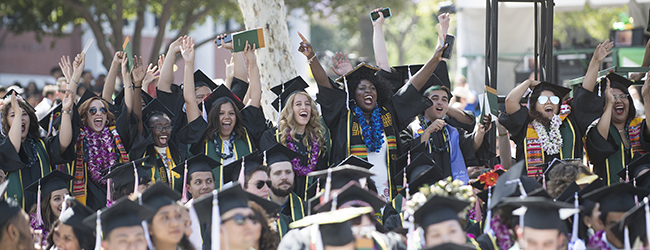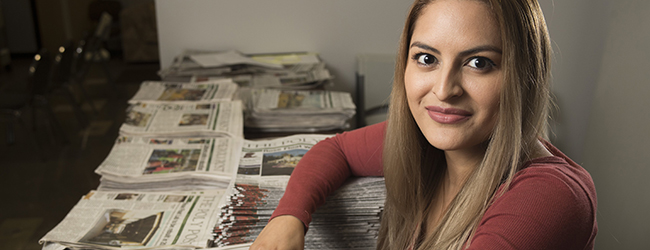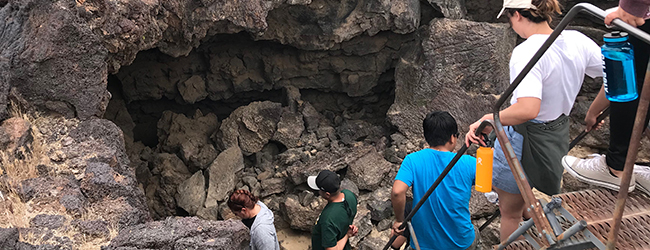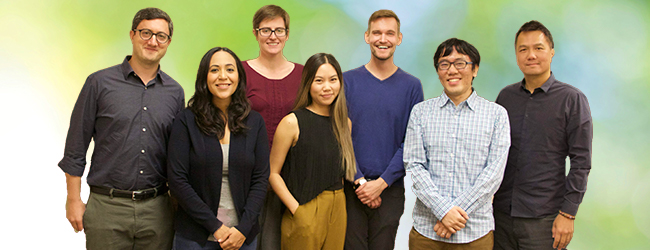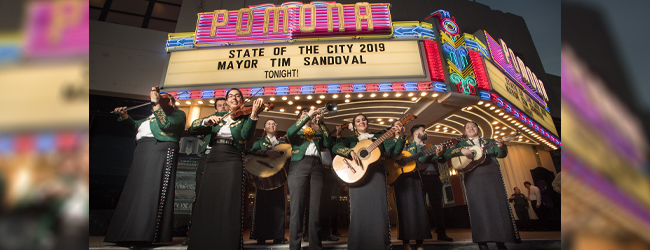Strategic Plan
"We cultivate success through a diverse culture of experiential learning, discovery, and innovation."
- Dr. Iris S. Levine

Throughout the course of the 2018-19 academic year, the college engaged Dr. John Welty, consultant, to assist with the development of a strategic plan. This finalized document is the result of many long hours of work by faculty, staff, and administrators of the College of Letters, Arts, and Social Sciences (CLASS). With the leadership of our steering committee, and participation of faculty and staff during three college town hall meetings (a collective effort of 125 faculty and staff), and focus groups from those town hall meetings, we created the following strategic plan which states our mission, vision, values, and strategic objectives. Our mission aligns closely with Cal Poly Pomona University’s mission:
We cultivate success through a diverse culture of experiential learning, discovery, and innovation.
The following plan will be evaluated annually and revised as needed.
Dr. Iris S. Levine, Dean
College of Letters, Arts, and Social Sciences
We cultivate one's intellectual development, ethical reasoning, and aesthetic sensibility to support creative and critical thinking in a diverse world of competing challenges.
We will be a supportive, engaged, and diverse community of teachers, learners, and scholars committed to improving the human condition and to bettering the world.
We the faculty, staff, and students of CLASS value:
- Theoretical and experimental approaches in developing critical thinkers and creative problem solvers,
- Discovery through research, scholarly, and creative activities,
- Transparency, equity, empathy, integrity, diversity, and
- Working towards a just, humane, and inclusive world.
Goal 1: Promote student success at the university and prepare students for their futures.
|
Goal 1 - Outcome 1 - Action Items: |
|
Develop department 4-year course offerings to assist students with more effective course planning. |
|
Use student survey data to better understand challenges to persistence and graduation in order to more effectively allocate resources. |
|
Allocate the appropriate number of bottleneck courses on a term by term basis. |
|
Provide robust programming in the Student Success Center, including individual advising and workshops, as well as training and resources for faculty. |
|
Expand targeted interventions for URM and first gen students, (i.e., continue to institutionalize FirstCLASS Coaching program for URM FTF, launch a peer mentor program aimed at URM/FirstGen students with sophomore standing. |
|
Increase faculty participation in FirstCLASS coaching program. |
|
Increase partnerships with the cultural centers to facilitate student engagement with the college. |
|
Goal 1 - Outcome 2 - Action Items: |
|
Evaluate and assess the need for curriculum revisions. |
|
Provide opportunities for all majors to engage in High Impact Practices. |
|
Expand available scholarships to reward student academic success and help meet financial need. |
|
Provide faculty support for course re-design to address course-based equity gaps. |
|
Support faculty innovation regarding student engagement and belonging (i.e. establishing cohorts, co-curricular programming). |
|
Develop a list of signature experiences in CLASS and disseminate that information to students. |
|
Provide supplemental instruction for high DFW courses. |
|
Goal 1 - Outcome 3 - Action Items: |
|
Develop and implement departmental career readiness plans. |
|
Foster alumni relationships within departments via activities such as Professor for a Day. |
|
In partnership with the Career center, provide resources and offer workshops that address the needs of CLASS students. |
|
Support student organizations and co-curricular activities that engage students with career and networking opportunities throughout their academic careers. |
Goal 2: Provide leadership to create and maintain a robust and meaningful GE program that emphasizes creative and critical thinking.
|
Goal 2 - Outcome 1 - Action Items: |
|
Embed pre- and post-course survey questions to collect feedback on students’ perception of a GE course’s impact. |
|
Develop advising documents for faculty and staff that suggest ways to support students in their choice of GE courses. |
|
Provide pedagogical and programming resources to promote the connection of GE courses to the world beyond the CPP experience. |
|
Develop a list of talking points that articulate the value of GE in encouraging intellectual flexibility, empathy, creativity, and curiosity. |
|
Goal 2 - Outcome 2 - Action Items: |
|
Develop a cohort of faculty and staff in CLASS to advocate effectively for GE in committees and the Senate. |
|
Collect and report annually to CLASS noteworthy activities that have taken place in department’s GE courses. Compile these for publicizing in various contexts, on and off campus (committees, public relations, websites, etc.). |
|
Provide release time for the CLASS Teaching and Learning committee chair. |
Goal 3: Recruit and retain excellent and diverse faculty and staff.
|
Goal 3 - Outcome 1 - Action Items: |
|
Reflect and report on best practices of past search committees to inform future searches. |
|
Invite experts to meet with college leadership to inform the search process. |
|
Leverage existing resources to inform and recruit diverse prospective faculty and staff. |
|
Goal 3 - Outcome 2 - Action Items: |
|
Establish baselines for faculty and staff mentoring programs. |
|
Design mentoring circles that include new and established faculty both within and between departments. |
|
Hold meetings with the Dean and Associate Deans in Fall and Spring terms to address issues of interest to new faculty. |
|
Invite new faculty in the prior year to act as mentors for new faculty in addition to mentors assigned by the department. |
|
Provide mentoring and support professional development opportunities for staff. |
|
Goal 3 - Outcome 3 - Action Items: |
|
Form a small committee to develop and implement a survey or focus groups to determine job satisfaction. |
|
Develop and actualize an action plan to increase job satisfaction for staff. |
|
Assess the effectiveness of the action plan. |
|
Goal 3 - Outcome 4 - Action Items: |
|
Survey faculty in the college to determine job satisfaction. |
|
Develop and implement an action plan to increase faculty job satisfaction. |
|
Assess the effectiveness of the plan. |
|
Identify potential funding sources and other mechanisms to support faculty. |
Goal 4: Promote and support world-class faculty.
|
Goal 4 - Outcome 1 - Action Items: |
|
Determine the space availability and technology readiness for supporting the college’s teaching, research, and creative activities. |
|
Create a prioritized critical needs list based on the above data for the acquisition, use, and modification of infrastructure and technology. |
|
Achieve 10% of the items on the critical needs list. |
|
Goal 4 - Outcome 2 - Action Items: |
|
Determine the amount spent by the college on faculty assigned time in the prior academic year, and the purposes for the assigned time. |
|
Measure the number of faculty applications for assigned time from all available internal and external sources. |
|
Examine the above information to determine how to increase the amount of resources available to support scholarly and creative work. |
|
Provide workshops on successful applications by awardees and increase the number of faculty applications for assigned time by an additional 10%. |
|
Institute a Dean’s Travel Fund for faculty to supplement currently available travel money. |
|
Goal 4 - Outcome 3 - Action Items: |
|
Provide at least two workshops annually on issues related to teaching, research, or creative activities. |
|
Create opportunities annually for collaborative teaching and scholarship, such as the Dean’s Invited Lecture Series, to support and enhance faculty excellence. |
|
Create interdisciplinary research and creative activity groups annually that each focus on a specific topic of interest to faculty. |
Goal 5: Enhance the visibility and stature of the College of Letters, Arts, and Social Sciences.
|
Goal 5 - Outcome 1 - Action Items: |
|
Create a college communications team. |
|
Develop a college marketing and communications plan. |
|
Enhance the relationship with Strategic Communications and Alumni Affairs to leverage their resources and increase publicity for the college. |
|
Create an effective process for sharing news of accomplishments, activities, and events with the campus and external communities. |
|
Implement the marketing and communication plan. |
|
Goal 5 - Outcome 2 - Action Items: |
|
Create a collaborative relationship with the Center for Community Engagement. |
|
Inventory and assess current programs and include data and outcomes of community partnerships in the faculty annual report. |
|
Assist departments in identifying and creating potential new community partnerships. |
|
Encourage the offering of service learning courses through the retention, tenure, and promotion process. |
|
Goal 5 - Outcome 3 - Action Items: |
|
Establish a robust and engaged CLASS Advisory Board. |
|
Establish one college-wide event annually for donors, alumni, and community. |
|
Identify appropriate opportunities or events (such as Professor for a Day) to invite alumni, donors, and/or community members. |
|
Work closely with departments to identify and nurture faculty-alumni relationships. |

